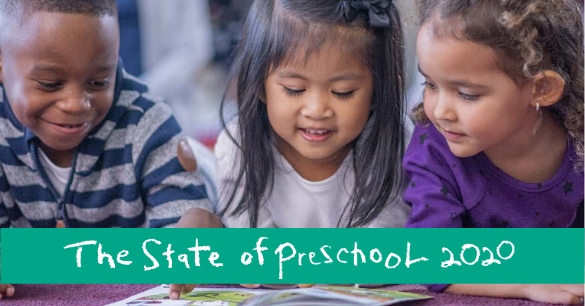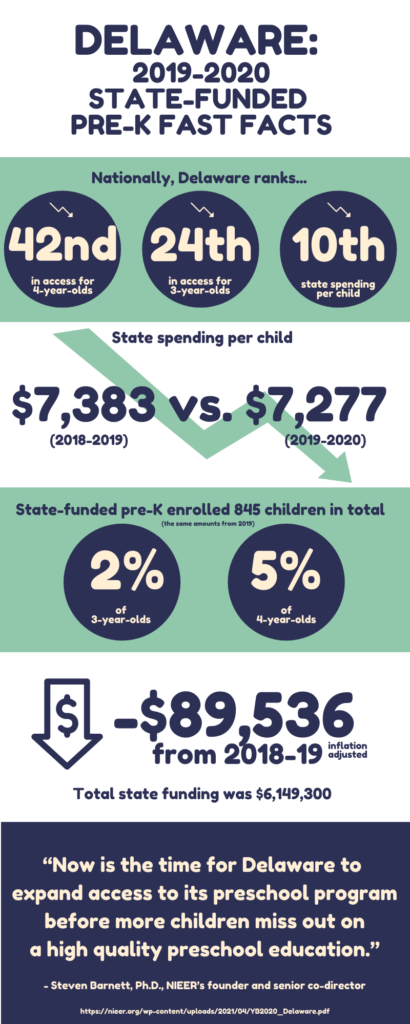Delaware Falls to 42nd on Pre-K Ranking, Below All Neighboring States

Delaware slipped further behind in national rankings for providing access to state-funded preschool for children. The National Institute for Early Education Research (NIEER) released its latest rankings for pre-K enrollment, and, much like last year and the years before, Delaware is ranked among the bottom states. This year, Delaware came in 42nd in providing access to state-funded pre-K to four-year-olds, down from 41st last year. Delaware also ranks 24th among states in providing access to three-year-olds, a decrease from last year’s ranking of 22nd.
Delaware Landscape
NIEER’s rankings put Delaware behind all of our neighboring states and many others across the country (including states like Alabama). Delaware serves only 845 students in state-funded pre-K, which represents two percent of Delaware’s three-year-olds and five percent of four-year olds. If Delaware doubled the number of children that have access to pre-K, we would still stay in the bottom of state rankings.
As NIEER points out, Delaware families take advantage of other programs that serve three- and four-year-olds with funding from the federal government (like Head Start) or private pay. The exact numbers are unclear, but Head Start enrolls approximately six percent of local three-year-olds and eight percent of four-year-olds. About 78 percent of four-year-olds and 85 percent of three-year-olds are enrolled in other types of pre-K or no program at all.

Dr. Steven Barnett, NIEER’s senior co-director and founder has said that “even when the economy has been strong, [Delaware’s] progress providing state pre-K has been slow and uneven.”
Little has changed with Delaware’s NIEER standing since 2002, with preschool enrollment and spending per child remaining relatively flat. Delaware continues to invest four times more in K-12 students than it does in three- and four-year-olds, despite the fact that birth to age five are critical years for a child’s development.
Delaware’s state-funded mixed delivery pre-K program for three- and four-year-olds (the Delaware Early Childhood Assistance Program, or ECAP) has not been expanded since its inception in the 1990s.
As part of his FY22 recommended budget for fiscal year 2022, Governor Carney indicated he will propose a future budget to double the state’s financial investment in ECAP from $6 million to $12 million amount by 2023-2024. This proposed increase comes as part of the school funding lawsuit settlement that was announced this past fall.
That investment would mark a small improvement for Delaware, but as advocates have noted, it would still come up far short of reaching all possible children. If we invested at the proposed rate of the settlement, we won’t be able to serve all our four-year-olds in high-quality programs for another 60 years, at which point a child entering pre-K today could file for social security.
Is Now the Perfect Time for Big Investment?
NIEER also released a brief that explores what it would take for the U.S. to expand access to pre-K on a wide scale. The group’s model depends on both state and federal governments splitting the bill to expand pre-K to low-income children within 10 years, and all children within 20 years. Cost-sharing between states and the federal government is a model that, as NIEER mentions, has been implemented with success before. With a major influx of funding from the American Rescue Plan and other sources, Local Education Agencies (LEAs) can consider adding pre-K slots or new capital projects.
According to Barnett, “Delaware continues to leave many children without access to high-quality pre-K” and in order to “make progress and expand access, state leaders must increase investment.”
Much more is needed to achieve the long-term vision of pre-K for all Delaware children. As we’ve said many times on this blog, investments in quality early learning yield enormous returns, for students, families, and society as a whole. Read more about Pre-K and expanding access to pre-K is important.
Call to Action
- Ask the legislature and members of the Joint Finance Committee to increase state investments in pre-K to support the workforce to attain higher qualifications and to expand access to high-quality, mixed-delivery pre-k.
- Plug into Delaware’s Early Childhood Education Advocacy Day on April 29. A panel of early childhood education advocates will discuss the child care industry and policy changes and investments to increase equity and save the child care industry.
- Learn more and find out how you can share your voice for Delaware’s kids and families by visiting FirstStatePreK.com.
Related Topics: Delaware education, delaware schools, early learning, NIEER, pre-k